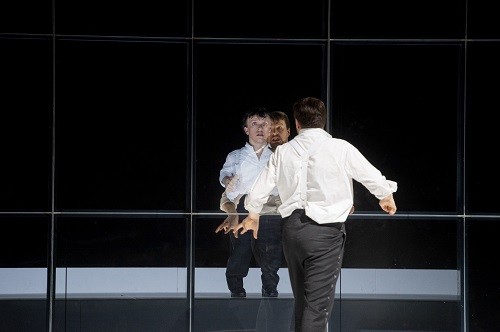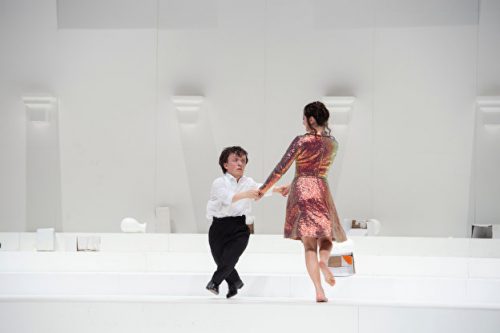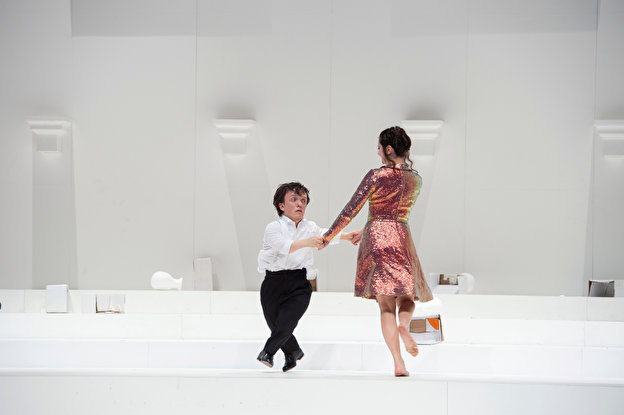 Germany Zemlinsky, Der Zwerg: Soloists, Ladies of the Chorus of the Deutsche Oper Berlin, Orchestra of the Deutsche Oper Berlin / Donald Runnicles (conductor). Filmed (directed by Götz Filenius) at the Deutsche Oper Berlin in March 2013. Reviewed when streamed in January 2021 and the earlier published review from a performance on 12.4.2019. (JP) (MB)
Germany Zemlinsky, Der Zwerg: Soloists, Ladies of the Chorus of the Deutsche Oper Berlin, Orchestra of the Deutsche Oper Berlin / Donald Runnicles (conductor). Filmed (directed by Götz Filenius) at the Deutsche Oper Berlin in March 2013. Reviewed when streamed in January 2021 and the earlier published review from a performance on 12.4.2019. (JP) (MB)

Production:
Director – Tobias Kratzer
Sets and Costumes – Rainer Sellmaier
Lighting – Stefan Woinke
Dramaturgy – Sebastian Hanusa
Choir master – Jeremy Bines
Cast:
Donna Clara – Elena Tsallagova
Ghita – Emily Magee
The Dwarf – David Butt Philip
The Dwarf (actor) – Mick Morris Mehnert
Don Estoban – Philipp Jekal
The First Maid – Flurina Stucki
The Second Maid – Amber Fasquelle
The Third Maid – Maiju Vaahtoluoto
Companions – So Young Park, Kristina Häger (12.4.2013: Carolina Dawabe Valle, Margarita Greiner)
Alma Schindler (pianist) – Adelle Eslinger
Alexander von Zemlinsky (pianist) – Evgeny Nikiforov
Jim Pritchard wrote: For a few days at the end of January 2021 Deutsche Oper Berlin made available their recording of Zemlinsky’s Der Zwerg from March 2019. I intended to review it before I discovered that Mark Berry had written about it the following month with essentially the same cast. Since Mark has probably forgotten more about music than I have ever known – even at my advanced age – I refer you to what he wrote below and limit myself to just a few observations.
One 26 February 1900, 20-year-old socialite Alma Schindler wrote about meeting up-and-coming 28-year-old composer. Alexander von Zemlinsky, and described him as ‘dreadfully ugly, almost chinless’ though she ‘found him quite enthralling’ nonetheless. Alma showed him some of her songs and he became her composition teacher and from autumn 1900 he was rather more than that to her and theirs was a stormy, problematic – somewhat secretive – love affair that lasted about a year until Alma met Gustav Mahler and soon married him. For Alma it was ‘a beauty and the beast’ relationship and despite Zemlinsky’s apparent erotic charisma she became disenchanted by his appearance and recorded some anti-Semitic remarks about any potential children, were she to marry him.
Tobias Kratzer begins his staging of Zemlinsky’s 1922 one-act opera Der Zwerg with a prologue to Arnold Schoenberg’s 1930 Accompanying Music to a Film Scene for orchestra. Schoenberg’s music is subtitled ‘Threatening Danger, Fear, Catastrophe’ to describe the moods encompassed by the short work. What Kratzer shows us is Zemlinsky’s infatuation with Alma though she scares him; eventually he steels himself to play the piano with her and also pluck up the courage to give her a kiss. Alma eventually becomes bored with Zemlinsky and appears to get migraines. She is increasing repulsed by him and eventually points him at a mirror and laughs. For his part he has brought her his new score to look at which she contemptuously tosses aside.
Clearly Zemlinsky held a grudge for a most of his life (probably) and certainly for at least twenty years until he finished the semi-autobiographical Der Zwerg, a loose adaptation of an Oscar Wilde short story The Birthday of the Infanta. A sultan sends a dwarf as a present to the Infanta (Spanish princess) Donna Clara on her 18th birthday. The Dwarf has no idea what he looks like and believes himself to be a handsome knight. As he becomes increasingly infatuated with Donna Clara, he sings her a love song and she indulges him and presents him with a white rose. Left alone, by accident he looks into a mirror and catches his own reflection for the very first time. Increasingly distraught he tries to kiss Donna Clara, but he disgusts her and she calls him a monster. The Dwarf dies of a broken heart clutching the white rose Donna Clara had given him as she goes on with her party.
For Kratzer Donna Clara is a social media influencer with her posse posting selfies on their Instagram accounts before having their mobiles confiscated. This vainglorious Donna Clara wears a sparkly rose gold dress, chews gum, and frequently clutches a pink balloon. Everyone is there to celebrate Donna Clara’s birthday with an orchestral concert and as the latest ‘must have’ there is the new song from the leading conductor-composer of the day, the Dwarf. (She has been showered with gifts and earlier roamed the assembled musicians: a harp was some soft, delicate lace; flute and clarinet together formed a cross of topaz and ivory; and a tambourine was a coronet of gold and rubies.) Donna Clara toys with the Dwarf’s affections, and initially – although she finds his appearance off-putting to put it mildly – she is seduced by his voice. Later her cruelty to him knows no bounds and ridiculing the Dwarf as a ‘funny puppet’ and ‘a laughing stock’ brings about his sad end. At that moment Donna Clara heartlessly announces ‘My present is spoiled already, the toy for my 18th birthday. Right, then, I’ll go on dancing’.
During Kratzer’s Der Zwerg some musical instruments are smashed and so too are the busts of famous composers that we have seen against the walls of the white concert space, yet one bust is replaced at the end, Alexander von Zemlinsky if you haven’t guessed.
With the subject matter focussing on obsession having originated from the genius of Oscar Wilde and because of certain of its words and musical phrases, it is clear that Der Zwerg owes a great deal to Richard Strauss’s Salome. For instance, compare Salome’s ‘I have kissed your mouth, Jochanaan’ with the Dwarf’s ‘She gave me a white rose, she danced with me’.
Zemlinsky’s orchestral textures are ravishing and Der Zwerg (as well as the earlier Schoenberg) were given full musical value by Donald Runnicles and the Deutsche Oper Berlin’s orchestra. There were several impressive vignettes, not least Elena Tsallagova’s oddly alluring Donna Clara. Kudos to Mick Morris Mehnert who acted the Dwarf in a nuanced and very moving way and to David Butt Philip’s Dwarf whose singing (and acting) had great pathos and elicited considerable sympathy for his character’s plight. Butt Philip’s overall performance was less mannered than I have seen him of late and his voice was lyrical and poetic. (Jim Pritchard)
Mark Berry wrote: ‘I have always thought and still believe that he was a great composer. Maybe his time will come earlier than we think.’ Arnold Schoenberg was not always given to exaggerated enthusiasm for the music of his contemporaries; he could hardly, though, have been more emphatic in the case of his friend, brother-in-law, mentor, advocate, interpreter, and, of course, fellow composer, Alexander Zemlinsky.
I had told myself that I ought not to begin another piece on Zemlinsky with a reference to Schoenberg. In this case, however, the Deutsche Oper more or less made my decision for me, by prefacing this excellent new production of Zemlinsky’s one-act opera, Der Zwerg, with Schoenberg’s Accompaniment to a Film Scene, Op.34. Zemlinsky’s one-act opera dates from 1919-21, Schoenberg’s piece from the close of the 20s. Much separates them: not least, though certainly not only, Schoenberg’s adoption of the dodecaphonic method. Yet they have common roots as well as kinship; the opening, additional scene to Tobias Kratzer’s staging makes that clear, despatching us – and Zemlinsky – back two decades, to a fashionable drawing room, in which the hapless, lovelorn Zemlinsky attempts to teach Mahler at the piano. Alma Mahler, that is, or rather Alma Schindler, whose rejection of Zemlinsky, depicted or rather imagined here, hit Zemlinsky hard. Alex finds Alma irresistible – many did – yet she finds him repellent, ridiculous; she pushes him away, mocks him. Kratzer makes clear that this is a way in, as much for the composer and work as for us: in no sense an explanation or reduction. I had worried that Schoenberg’s music might overshadow what came afterwards – and perhaps it did, ever so slightly – but no harm was done, and there was wit in the over-emphasis on the already prominent piano part as ‘learned’ and ‘performed’ by the figures at the piano. Anticipations of Schoenberg’s actual Piano Concerto, both from the Brahmsian and Wagnerian wings – gross oversimplification, I know – intrigued.
But back to Zemlinsky and Der Zwerg. We then move to the court of the Spanish Infanta: a theatre of cruelty, wonder, superficiality, and, of course, riches. It was difficult not to think a little of Salome here, not only on account of Oscar Wilde (whose short story this is). The dwarf given as the Infanta’s eighteenth-birthday present is not Zemlinsky – although Alma, with typical charity, would refer to him in her memoirs as a ‘horrible dwarf’ – but the trauma of his rejection feeds character and drama, as it had in works such as Eine florentinische Tragödie and Die Seejungfrau. Here, we see him in two different ways: as an actual ‘dwarf’, finely acted by Mick Morris Mehnert, and as he sees – and hears – himself, a musician (which he is, far from coincidentally), sung in parallel concert dress and increasingly acted by David Butt Philip. Singing is the dwarf’s act: without that, he would, as an ‘ugly’ person, be nothing. It enables him to be ‘merely’ ridiculous, in the eyes of the court. It is the crushing realisation that the child – no more than Salome is she capable of empathy, of love – does not, could not love him that has him confront his actual image, the singer at last seeing the dwarf in the mirror. Such is the central tragedy of recognition, of despair, of revulsion, of death.

(c) Monika Ritterhaus
Yet, as in Salome, we also sense the tragedy of the Infanta, Donna Clara. The ladies of the court egg her on; is there any way, in this stifling, stylish, ‘aestheticised’ atmosphere, that she could have become more human? (What chance, after all, did Alma have in her world of being taken seriously as a musician, as a woman, as a human being?) Images or potential images abound. For the arrival of the gift itself – sorry, himself – mobile telephones are taken from the guests. How keen they would have been to relay their amusement to a wider audience; they doubtless still will, long after the unfortunate object of their derision has been forgotten. So too do ideas of music and musicians, of art and artists. An orchestra is assembled, and quickly disassembled. Busts of artists – of men – surround the stage and even – rightly, we feel – are smashed, like some of those instruments. Is it perhaps too hopeful to install Zemlinsky’s bust centre-stage at the close, as is accomplished here? Yes – and no. That is surely the point. Zemlinsky’s time may or may not have come.
It certainly has done in terms of musical performance. Butt Philip, in surely the finest, most commanding performance I have yet heard from him, enticed and engaged. Elena Tsallagova captured to a tee the difficult balancing act in a direction that was somehow both the same and different, likewise as impressive in song as in demeanour. Emily Magee and Philipp Jekal both impressed as Ghita, the lady-in-waiting who must tell the Dwarf who he is – the Infanta lacks courage or even inclination – and Don Estoban, supposedly master of ceremonies, yet quite out of his depth. They helped us understand why, to appreciate failings that perhaps fell short of tragedy, but which certainly helped prepare the way for it. Smaller roles were all well taken, the chorus well prepared both vocally and on stage.
This was above all, though, an achievement for Donald Runnicles and the Orchestra of the Deutsche Oper – pointing us, perhaps, to the truth that it is in the orchestra that Zemlinsky is most at home. It is easy to point to what he and his music are not – Schoenberg, Mahler, Strauss… – and many would doubtless have done so again on this occasion. Here, at least, the score never quite blooms as it might have done with those composers; and, to be fair, as it does in Zemlinsky’s own Lyric Symphony. But one heard the kinship with that score in particular, melodic and harmonic characteristics never to be reduced to ‘influence’, but of a nature that we may well recognise better when the composer’s time truly has come. Runnicles conducted as if this were a repertoire work, its harmonic structure and meaning as clear, its colours as specifically delineated and blended, as if he were conducting Wagner or Strauss (or Schoenberg, etc.) There was more here, one felt, than could possibly be discerned in a single hearing. The opera’s close in the ‘wrong’ key, Mahlerian ‘progressive’ tonality turned regressive, made its own tragic point. Zemlinsky and his opera were given a voice – if, but only if, we listen.
In 1959, another modernist critic, perhaps still more exacting than Schoenberg, Theodor Adorno, wrote of Zemlinsky in surprisingly glowing terms. He had ‘made more of the compromises characteristic of an eclectic than any other first-rate composer of his generation. Yet his eclecticism demonstrated genius in its truly seismographic sensitivity to the stimuli by which he allowed himself to be overwhelmed.’ We often look more warily than Adorno or Schoenberg upon Romantic notions of genius, even as our concert halls, opera houses, and much popular discourse cling to them. Once more: has Zemlinsky’s time come? What of Alma’s too? Will those questions ever be beside the point? Should they ever? (Mark Berry)
For more about Deutsche Oper Berlin click here.
